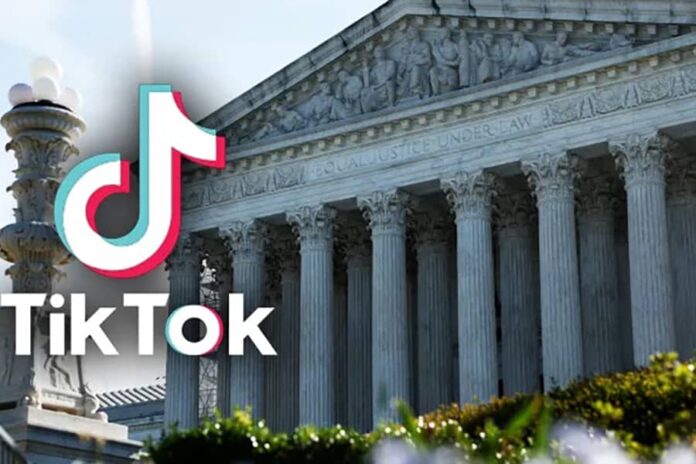TikTok will “go dark” after January 19 unless the Supreme Court intervenes to stop a law to force its Chinese parent to sell or face a ban on U.S. platforms.
“At least as I understand it, we go dark, the platform shuts down,” Noel Francisco, TikTok’s attorney, told Justice Brett Kavanaugh.
In a bipartisan vote, Congress last year passed the law, signed by President Joe Biden, out of national security concerns that the Chinese government ultimately would be able to access TikTok user data and manipulate content for U.S. audiences.
A federal appeals court last month upheld the law, determining that the national security concerns were enough to survive the strict scrutiny of the impact that the TikTok measure would have on First Amendment rights.
The Supreme Court then slated oral arguments on TikTok’s emergency petition.
Today, in the more than two hours that the justices heard from attorneys for the government, the company and TikTok creators, the justices several times raised the possibility of putting the law on hold until underlying issues are resolved.
Francisco said that issuing a preliminary injunction or an administrative stay would “buy everyone a little breathing space,” adding that it was “why a short reprieve here would make all the sense in the world.”
But the justices also took seriously the concerns of the government, bolstered by the fact that the law passed with so much support on both sides of the aisle.
At one point, Kavanaugh told TikTok’s attorney, “Congress and the president were concerned that China was accessing information about millions of Americans, tens of millions of Americans, including teenagers, people in their 20s, that they would use that information over time to develop spies to turn people, to blackmail people, people who, a generation from now will be working in the FBI and the State Department.”
Kavanaugh asked, “Is that not a realistic assessment by Congress and the president of the risks here?”
Francisco replied, “I am not disputing the risks. I am disputing the means that they have chosen.”
Solicitor General Elizabeth Prelogar, representing the government, said that “what Congress was worried about here was not regulating speech as such but instead regulating foreign adversary control.”
She told the justices that the question would be entirely different if TikTok were an American corporation.
“The reason we know the statute is different is because all the same speech that’s happening on TikTok could happen post-divestiture,” she said. “The act doesn’t regulate that at all. So it’s not saying, ‘You can’t have pro-China speech. You can’t have anti-American speech. It’s not regulating the algorithm. TikTok, if it were able to do so could use precisely the same algorithm to display the same content by the same users. All the act is doing is trying to surgically remove the ability of a foreign adversary nation to get our data and to be able to exercise control over the platform.”
Francisco, though, said that the law “ultimately boils down to speech,” as Congress singled out TikTok yet did not adequately or even consider alternatives, like restrictions on the sharing of user data or requiring disclosure of its ownership. He also pointed out that Chinese e-commerce sites also collect user data from U.S. consumers, yet are not facing a ban.
“I think TikTok has First Amendment rights. To the extent that ByteDance is speaking in the United States, it I believe has First Amendment rights. If you conclude that neither has First Amendment rights, then surely the creators have First Amendment rights. But if you take a step back, what their position is that none of these entities …have the authority to asset First Amendment rights, which means that the government really could come in and say, ‘I am going to shut down TikTok because it is too pro-Republican or too pro-Democrat, or won’t disseminate the speech I want, and that wouldn’t get First Amendment scrutiny by anybody. That cannot possibly be the case, but that is the effect of their position.”
Yet Chief Justice John Roberts expressed doubts over the law’s impact on the First Amendment. He asked Francisco whether he knew any other instance where a regulation of corporate structure has been treated “as a direct regulation of expressive conduct.”
“I don’t have one at my fingertips,” Francisco said.
That said, Prelogar, the government’s attorney, noted that the law still survived First Amendment strict scrutiny from the lower court.
Justice Neil Gorsuch did question her on why the government wouldn’t also have concerns over a foreign company owning a U.S. news outlet, pointing out the German ownership of Politico.
“We are not asking the court to articulate bright line rules to govern all kinds of hypothetical situations,” Prelogar said, adding that a newspaper is “not likely to be collecting sensitive information about 170 million plus people and then having the capacity to send that back to a foreign adversary.”
The Supreme Court is likely to quickly rule in the case, given the timeline. But President Donald Trump, who sought to force a sale of TikTok during his first term, now opposes the new law. Francisco suggested that Trump could extend the deadline, but he could not do that on January 19, because he won’t be president by then. He will be the next day.
“It is possible that come January 20th, 21st, 22nd, we might be in a different world,” he said.
There was a moment of levity when Roberts asked Prelogar, “Did I understand you to say…that one problem is that ByteDance might be through TikTok trying to get Americans to argue with each other? If they do, I would say they are winning.”
By Ted Johnson, deadline

